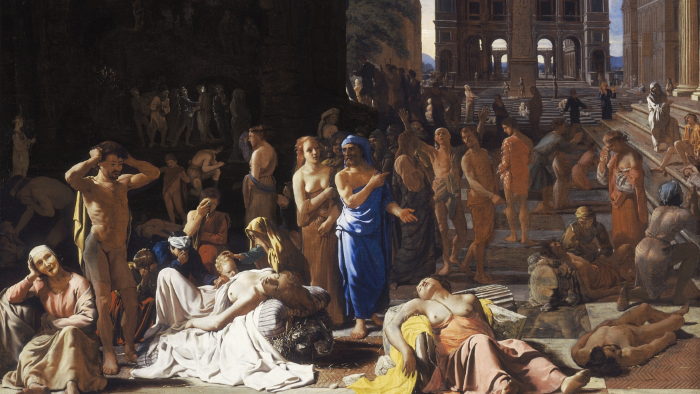

Thucydides’ Plague, and Ours (Section 3)
July 26, 2020 @ 4:30 pm - 6:00 pm
Thucydides’ account of the plague that struck Athens in 430 BCE is recalled / rediscovered whenever nations in the West experience a global epidemic or pandemic. It is famous both as a seminal chapter in plague literature, which served as a model for plague narratives in Lucretius, Virgil, Ovid, and Procopius, and as an important contribution to political thought for its treatment of the plague as both a symptom of and metaphor for political dysfunction. However, the tendency to treat Thucydides’ plague account as part of a tradition typically obscures what is distinctive and original about this account. The seminar will offer an opportunity to get to grips with the interpretation of this complex passage and to engage with debates in current scholarship. Moreover, the context for our reading – in the midst of a pandemic – means that we are well placed to notice certain details in Thucydides’ account, such as his focus on the altered experience of temporality during an epidemic.
This seminar is offered online by EverScholar. In order to encourage an optimal discussion experience, enrollment is limited to 9 persons. However, the seminar is also offered at two other times, also with Professor Greenwood. Register for the session that you are certain you can attend.
Our Professor: Emily Greenwood, Professor of Classics, Yale University
Emily Greenwood is Professor of Classics and Chair of the Classics department at Yale. She trained at the University of Cambridge and then taught at the University of St Andrews in Scotland before joining the faculty at Yale in 2009. She specializes in ancient Greek prose literature of the fifth and fourth centuries BCE, with a particular interest in historical narratives. Her initial interest in Classics grew out of curiosity about the circulation of ancient Greek and Roman works in so many different guises in the modern world and this curiosity continues to guide her research and teaching. In both she foregrounds questions of transmission, translation, adaptation and the role that different interpretative communities and traditions play in creating the works that we study. It is this interest in adaptation and the dynamic interrelationship between so-called “original” or “source” texts and subsequent versions which led to her collaboration on a course on The Tempest and its versions. She has published books on Thucydides’ History (Thucydides and the Shaping of History, 2006), and on responses to the Classics in Anglophone Caribbean Literature (Afro-Greeks, 2010). Her current research projects include reading Thucydides as war literature, and a tentative, tropological encyclopedia of Black Classicism.
To Register for this seminar, please complete the form below:
